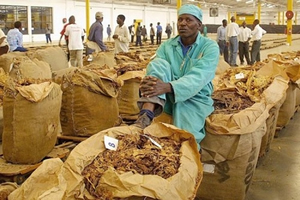A nation addicted to self-hate


Small-scale farmers sell tobacco during a clean-up sale at an auction floor in Harare in this file photo. Land reform is one of the policies that earned Zimbabwe demonisation from the West
Joram Nyathi Group Political Editor
EVERY passing day has exposed the challenges which government faces in raising money to fund Zim-Asset. The result has been strident calls for “policy clarity” or “policy consistency” from economists and foreign embassies to get the money. Those of a keen political bent have chipped in with a sharpened beak to ask cynically, “Where are the 2,2 million jobs?”
In more specific terms, the message has been clearer: land reform and black economic empowerment are bad policies. They must be reversed. John Robertson was blunt this week: “repeal indigenisation law” if you want foreign investment. The corollary is that only FDI can raise the $27 billion required to fund Zim-Asset but because of your bad policies, you won’t get that money.
Let’s clear land issue.
No government worth its electoral mandate would even debate whether or not to reverse the land reform programme. Economic empowerment is amenable to modification depending on the sector, for example how you deal with banks should be different from how you deal with a mining operation where Zimbabwe owns the natural resources. The bank is more about entrepreneurship, we have no intrinsic claim to a bank as a nation.
FDI and the $27 billion
Here is another illusion. Let’s start at Finance Minister Patrick Chinamasa’s door. Is it being suggested, as put in the Zim-Asset document, that Zimbabwe must raise $27 billion all at once before the policy can be implemented? I don’t think so. That would be naïve. Yet media reports and their analysts want to focus the nation’s attention on this misleading narrative, that this is the money Chinamasa is trying to raise. What would be the purpose of the policy if funding it requires what the nation on its own cannot possibly generate in five years, given our GDP?
Then the debate begins to move in circles. Besides government’s “evil” indigenisation policies which should be repealed before the country can attract foreign investors, we are told no, in fact you can’t get foreign funding because you are in arrears with multilateral lending institutions. So while you are “broke” you are still expected to clear your debts before you can borrow. And only the IMF, itself a creditor, can give a certificate of fitness before other lenders can come in. That leaves Zimbabwe in a cul de sac.
But that is only because we want to be misled by those angered by Zimbabwe’s radical policies, the decision to bunk orthodoxy, the refusal to conform to a developmental trajectory which has kept Africa stagnant because former colonial powers have been allowed to continue looting its resources long after the end of formal colonial rule. Unless government changes course, there will be no money to fund Zim-Asset. That’s the new slogan. As if government were ever deluded to believe money would come cheap!
Let the figures speak
In a report carried in the Financial Gazette last week, Zimbabwe National Chamber of Commerce president Hlanganiso Matangaidze told the chamber’s annual congress in Victoria Falls last week that global foreign direct investment was about $1,3 trillion in 2012. The whole of Africa got only $65 billion, translating to a measly 5 percent. Zimbabwe, he said, was getting less than 1 percent (about $650 million) despite its vast natural resources.
Matangaidze said there was need for government and business to jointly formulate a “national strategy” which attracted FDI. Let’s do some maths again. If $65 billion FDI invested in Africa had been shared equally among the 53 countries pursuing exactly the same policies with the same resources, Zimbabwe would have received about $1,2 billion in 2012. But investment is distributed according to preference, Zimbabwe being targeted for punishment for its rogue policies.
Yet all of Africa must share this measly $65 billion. Which possibly means to be able to generate $27 billion required to fund Zim-Asset, Zimbabwe would not only need to reverse the land reform but also to abandon its economic empowerment programmes, remove all security for workers, scrap all levies on mineral exploration, taxes and royalties, duty on capital and raw material imports, allow 100 percent remittances by foreign investors. In short, open the border and put up a hoarding proclaiming, “Zimbabwe open for business, Closing down sale on!”
Implicitly, that is the only way we would be able to get more investment than all the other African countries which have not committed the sin of taking back their land nor pursued radical black economic empowerment policies. Is that the cost and benefit of investment?
Land reform
Where is business? Matangaidze and his group are aware of the root cause of Zimbabwe’s problems. This is what he said: “Zimbabwe has been demonised by mainly the Western countries ever since it embarked on the land reform programme. Regrettably, foreign investors who rely upon the World Bank and the International Monetary Fund for information regarding the safety or otherwise of cross border investments have an erroneous notion that property rights are not respected in Zimbabwe and that has been negatively affecting FDI inflows.”
Yet in the next sentence he warns that Zimbabwe’s economic growth will slow further this year “in the face of policy inconsistencies and subdued business confidence.” No sense of contradiction from his observation that the country is being “demonised” for land reform and that foreign investors are being fed “erroneous” information about security of property rights. In other words the land reform programme itself has become part of “inconsistent policies” being pursued by the government!
Which means to make government policies consistent with Washington’s desires, Zimbabwe must simply recant all what the Third Chimurenga set out to do. By which, in one masterstroke, Zimbabwe shall have erected in front of all the striving people of the developing world looking for a model, a different development trajectory out of poverty, a monument to the labours of Sisyphus to serve at once as an enduring tribute to sceptics and the valour of those who have always fought to keep the African under heel. That would be the hallmark of policy inconsistency. What treachery to all the sacrifices of the liberation struggle – to buckle and collapse a few metres before the gates to the promised land!
The Financial Gazette report was titled “Call for strategies that attract FDI”.
Why always the West?
Zimbabwe is not an island. We cannot permanently look east as a nation nor shun the West. But that doesn’t mean we have to strip ourselves naked for the pleasure of those who promise investment, those who want to come and loot our resources in the name of employment creation.
Is it being seriously suggested, postulated even, that the thousands of striking platinum miners and metal workers in South Africa who are rejecting slave wages exhibit a higher human development index than an equal number of Zimbabwean families who have been allocated land and produced tobacco valued at more than $600 million this year?
Again last week, the Zimbabwe Mail reported on a local business think-tank, Zimbabwe-Southern African Development Community (Zim-Sadc) led by one Kingstone Kanyile who has a less gloomy picture of Zimbabwe without being a starry-eyed optimist.
Khanyile lamented that while government was signing MoUs and regional trade agreements and ZimTrade was doing a lot of research, this information and deals were not being co-ordinated to maximise Zimbabwe’s benefit. He noted that Zimbabwe had not followed up fully on its preferred destination status with China and on the technology transfer deal with India. These deals alone could easily earn the country $6 billion.
On the other hand Sadc still constitutes Zimbabwe’s biggest trading market, taking up 90 percent of exports in 2013 valued at about $3,2 billion.
Angola alone has an import bill of $20 billion which Zimbabwe can tap into. Why are we obsessed with the West whose conditions for trade and investment demand that we surrender all rights to our resources just to get menial jobs? Why do we have the fate of our nation tethered to institutions which want to strangle us over a $10 billion debt by denying us avenues of free trade? What with vile Obama piling fresh sanctions on our country!
This is our curse: we have become a nation addicted to self-hate, forever pining after false, foreign gods. Our policies are inconsistent with who? How can we build confidence in others when we have no confidence in ourselves, in our country’s potential and the skills we have as a nation? Who respects people who don’t respect themselves?
Our own MPs get “surprised” when they “discover” that Chitungwiza General Hospital is not the hellhole they “read” about in the media. The whole country gasps at the “miracle” of Siamese twins being separated at a place of death called Harare Central Hospital. We are even more shocked when publications such as SA’s Bloomberg run headlines on Zimbabwe stating, “Tobacco vindicates land reform”.
Kanyile is quoted commenting that it is pointless to boast about a high literacy rate if it has no economic value. “. . .Let us tap into the literary genius of the country and translate this into real economic value.” We have more miracles in us than we care to discover.










Comments